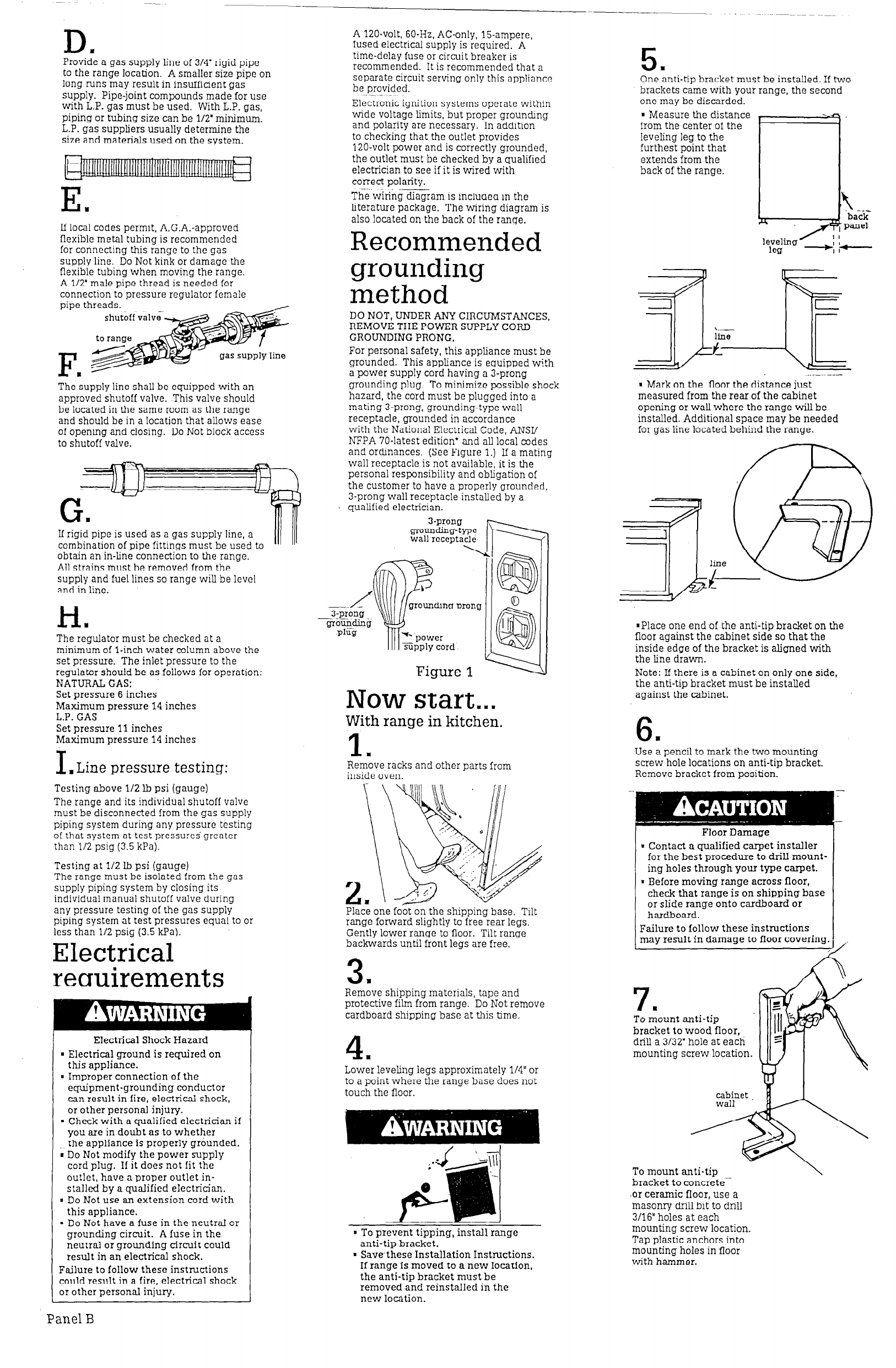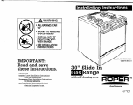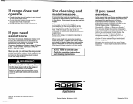
D .
A 120-volt, 60-Hz, AC-only, 15-ampere,
fused electrical supply is required. A
time-delay fuse or circuit breaker is
recommended. It is recommended that a
separate circuit serving only this appliance
be provided.
Electronic ignition systems operate within
wide voltage limits, but proper grounding
and polarity are necessary. In addition
to checking that the outlet provides
120-volt power and is correctly grounded,
the outlet must be checked by a qualified
electrician to see if it is wired with
correct polarity.
The wi&gzarn is incluaea in the
literature package. The wiring diagram is
also located on the back of the range.
5
One:nti-tip bracket must be installed. If two
brackets came with your range, the second
one may be discarded.
n Measure the distance
from the center of the
leveling leg to the
furthest point that
extends from the
back of the range.
Provide a gas supply line of 314’ rigid pipe
to the range location. A smaller size pipe on
long runs may result in insufficient gas
supply. Pipe-joint compounds made for use
with L.P. gas must be used. With L.P. gas,
piping or tubing size can be l/2’ minimum.
L.P. gas suppliers usually determine the
size and materials used on the system.
E
m
If local codes permit, A.G.A.-approved
flexible metal tubing is recommended
for connecting this range to the gas
supply line. Do Not kink or damage the
flexible tubing when moving the range.
A l/2’ male pipe thread is needed for
connection to pressure regulator female
pipe threads.
Recommended
grounding
method
DO NOT, UNDER ANY CIRCUMSTANCES,
REMOVE THE POWER SUPPLY CORD
GROUNDING PRONG.
For personal safety, this appliance must be
grounded. This appliance is equipped with
a power supply cord having a 3-prong
grounding plug. To minimize possible shock
hazard, the cord must be plugged into a
mating 3-prong, grounding-type wall
receptacle, grounded in accordance
with the National Electrical Code, ANSI/
NFPA 70-latest edition* and all local codes
and ordinances. (See Figure 1.) If a mating
wall receptacle is not available, it is the
personal responsibility and obligation of
the customer to have a properly grounded,
3-prong wall receptacle installed by a
qualified electrician.
F m
a Mark on the floor the distance just
measured from the rear of the cabinet
opening or wall where the range will be
installed. Additional space may be needed
for gas line located behind the range.
The supply line shall be equipped with an
approved shutoff valve. .This valve should
be located in the same room as the range
and should be in a location that allows ease
of opening and closing. Do Not block access
to shutoff valve.
3@
--
II
line
L
&prong
grounding-type
wall rccmtacle
@
1;;;1
fl
I ’
@
If rigid pipe is used as a gas supply line, a
combination of pipe fittings must be used to
obtain an in-line connection to the range.
All strains must be removed from the
supply and fuel lines so range will be level
and in line.
--.L
3-proqg
-_-
Qr;gJw
H .
The regulator must be checked at a
minimum of l-inch water mlumn above the
set pressure. The inlet pressure to the
regulator should be as follows for operation:
NATURAL GAS:
Set pressure 6 inches
Maximum pressure 14 inches
L.P. GAS
Set pressure 11 inches
Maximum pressure 14 inches
.Place one end of the anti-tip bracket on the
floor against the cabinet side so that the
inside edge of the bracket is aligned with
the line draw-n.
Note: If there is a cabinet on only one side,
the anti-tip bracket must be installed
against the cabinet.
Figure 1
Now start...
With range in kitchen.
6
m
1 .
Use a pencil to mark the two mounting
screw hole locations on anti-tip bracket.
Remove bracket from position.
I
, Line pressure testing:
Remove racks and other parts from
inside oven.
Testing above l/2 lb psi (gauge)
The range and its individual shutoff valve
must be disconnected from the gas supply
piping system during any pressure testing
of that system at test pressures’ greater
than l/2 psig (3.5 kPa).
Floor Damage
m Contact (I qualified carpet installer
for the best procedure to drill mount-
ing holes through your type carpet.
m Before moving range across floor,
check that range is on shipping base
or slide range onto cardboard or
hardboard.
Failure to follow these instructions
may result in damage to floor covering.
Testing at l/2 Ib psi (gauge)
The range must be isolated from the gas
supply piping system by closing its
individual manual shutoff valve during
any pressure testing of the gas supply
piping system at test pressures equal to or
less than l/2 psig (3.5 kPa).
r
L
Place one fobt on the shipping base. Tilt
range forward slightly to free rear legs.
Gently lower range to floor. Tilt range
backwards until front legs are free.
Electrical
recruirements
3
m
Remove shipping materials, tape and
protective film from range. Do Not remove
cardboard shipping base at this time.
To mount anti-tip
bracket to wood floor,
drill a 3132’ hole at each
mounting screw location.
Electrical Shock Hazard
. Electrical ground is required on
this appliance.
1 Improper connection of the
equipment-grounding conductor
can result in fire, electrical shock,
or other personal injury.
. Check with a qualified electrician if
you are in doubt as to whether
the appliance is properly grounded.
; Do Not modify the power supply
cord plug. If it does not fit the
outlet, have a proper outlet in-
stalled by a qualified electrician.
a Do Not use an extension cord with
this appliance.
. Do Not have a fuse in the neutral or
grounding circuit. A fuse in the
neutral or grounding circuit could
result in an electrical shock.
Failure to follow these instructions
could
result in
a fire, electrical shock
or other personal injury.
4
.
Lower leveling legs approximately l/4” or
to a point where the range base does not
touch the floor.
. To prevent tipping, install range
anti-tip bracket.
. Save-these Installation Instructions.
If range is moved to a new location,
the anti-tip bracket must be
removed and reinstalled in the
new loation.
To mount anti-tip
bracket to concrete-
.or ceramic floor, use a
masonry drill bit to drill
3/16” holes at each
mounting screw location.
Tap plastic anchors into
mounting holes in floor
with hammer.
Panel B









